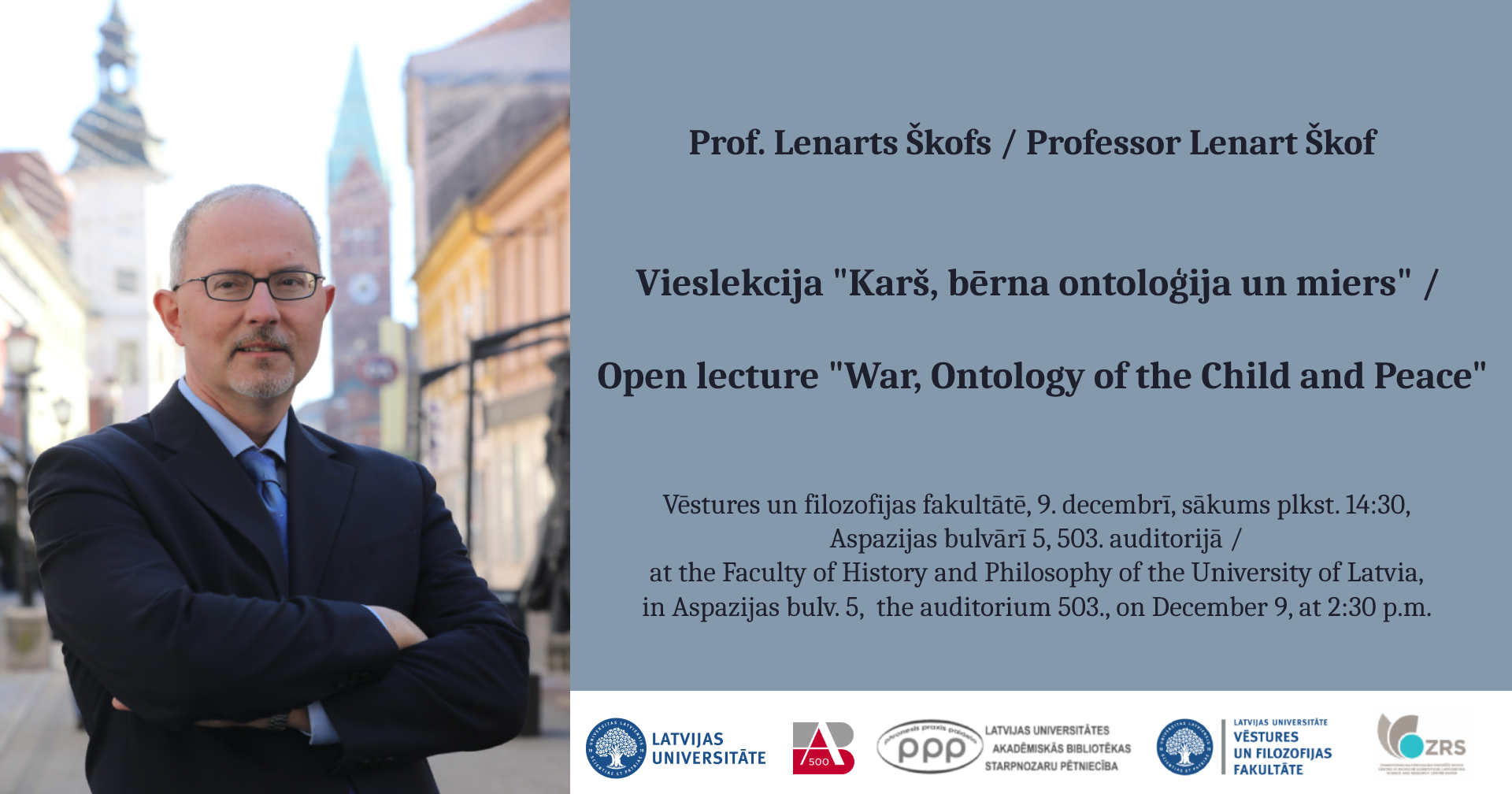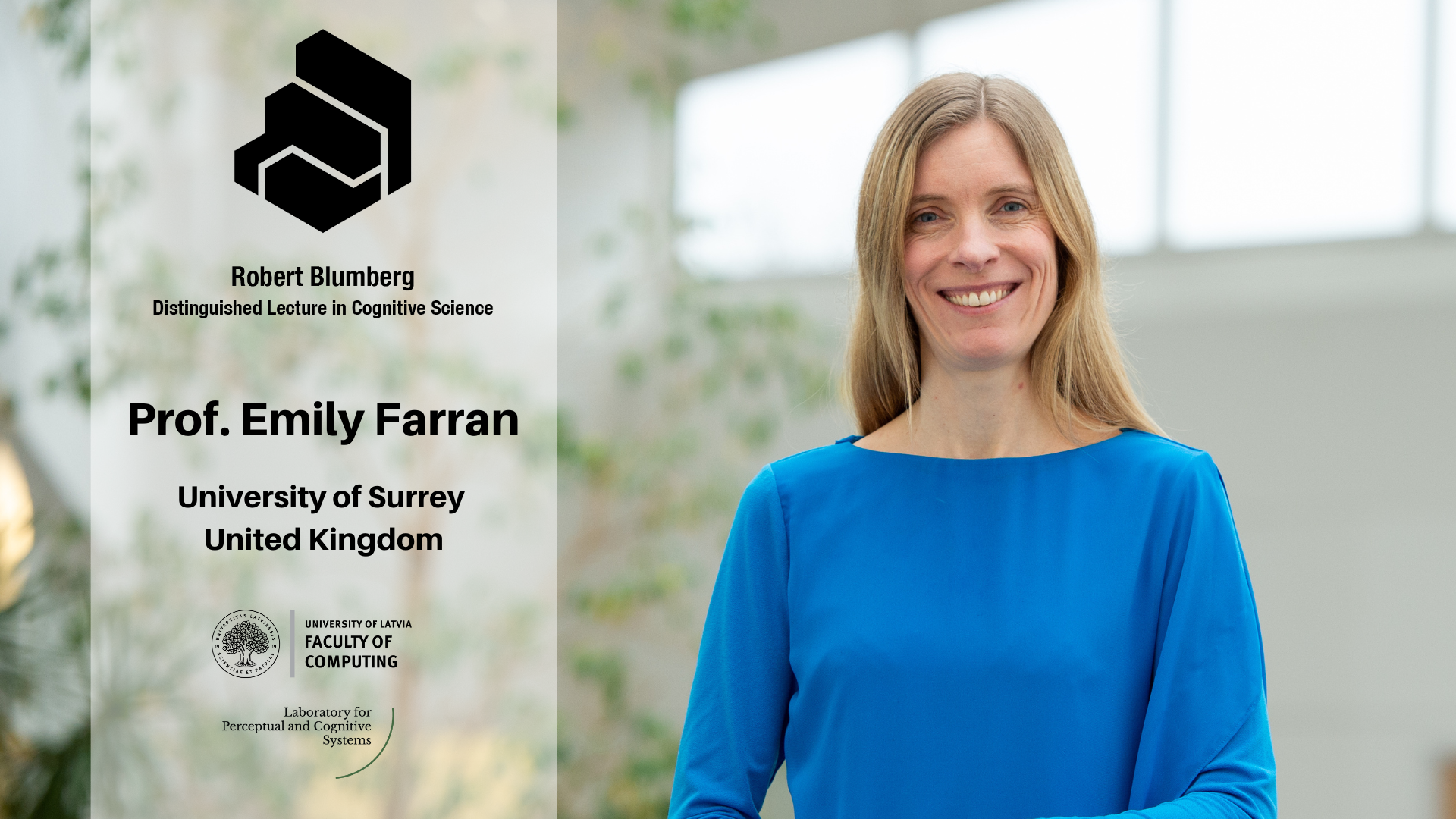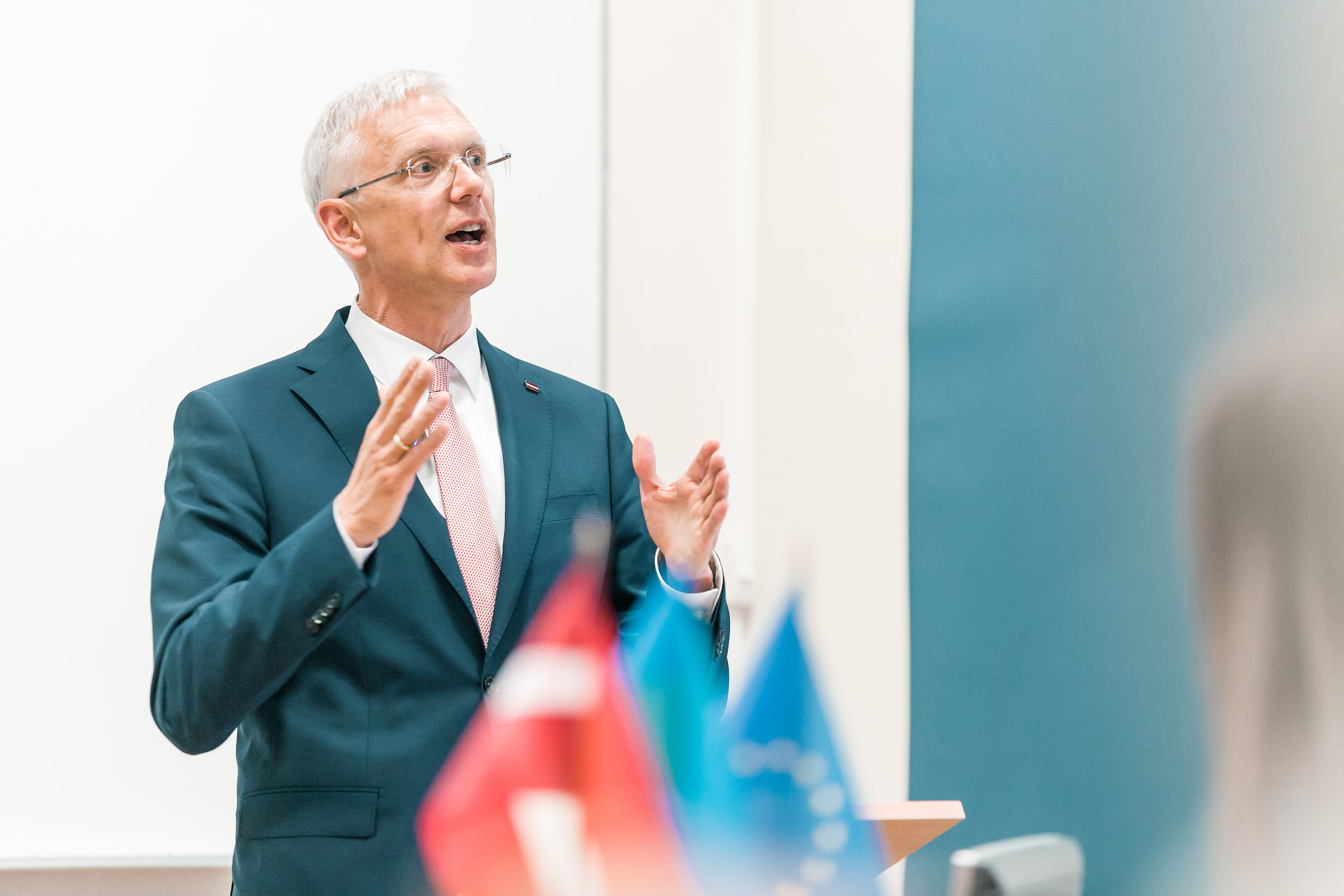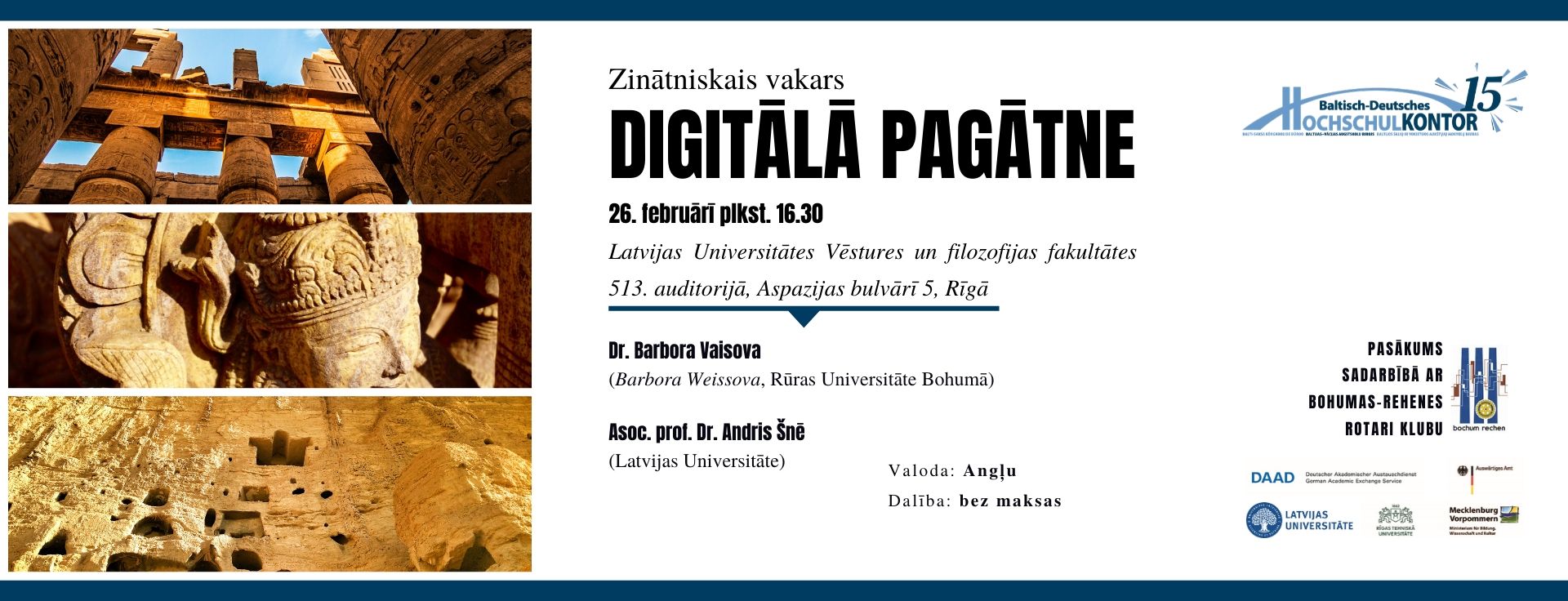The University of Latvia pays great attention to the development of international collaboration in order to promote international identification, exchanges and to strengthen good reputation.
The University of Latvia has been always active in international collaboration. Nowadays the objective is to focus on the content and quality in order to make internationalization a balanced element of education and research.
The internationalization processes take place in the following areas:
- bilateral cooperation agreements (with 232 universities in 53 countries and regions);
- membership in the international university organizations and networks;
- participation in international educational and research programmes and projects;
- exchanges of students and teachers (exchange statistics);
- international cooperation on the faculty, institute, department and individual levels.
By participating in international university organizations and active membership in networks such as EUA (The European University Association), UNICA (Network of Universities from the Capitals of Europe), UTRECHT Network, Campus Europea/EUF the University of Latvia strives to intensify different types of exchanges and to widen possibilities for internationalization of studies and research.
Active participation within bilateral partnership agreements and European programmes has promoted wide cooperation activities within ERASMUS+ programme. The number of agreements with European partner universities has grown tremendously within last 5 years anticipating more intensive exchanges of students and teachers. At present the University of Latvia has signed 1020 agreements with 447 institutions in 33 European programme and 38 Inter-institutional agreement with 17 partner countries.
The University of Latvia is also active in initiating and participating in ERASMUS+ projects (Capacity Building, Strategic Partnership, Knowledge Alliances, Jean Monnet). The University of Latvia strategy is to introduce innovative methods in education, to pay more attention to the development of staff competences. The ERASMUS+ projects help much the UL to achieve these strategic goals. One of the latest examples is the ERASMUS+ KA 203 project "Best+" (www.blendedmobility.eu) with the aim to create a new form of professional development for university staff using blended mobility.
The University of Latvia is the only Latvian institution with active participation in Erasmus Mundus programme. Successful participation in ten Erasmus Mundus Action 2 projects: JoinEU-SEE I, II, III; Triple I I, II; Aurora I, II; Centauri; Lot 3b; Mover; AESOP; LEADER has remarkably increased the number of international exchange and degree students from Western Balkan countries, Russia, Central and Southeast Asia, South Africa. The University of Latvia participated also in MISOCO Joint master’s degree programme International Migration and Social Cohesion.
The University of Latvia has become an attractive place to study both for full time and exchange international students. The number of available programmes and courses on English increase every year. The University of Latvia is glad that the faculties are active in involving visiting professors within the study process.
Cooperation in research has been also very active and productive. Participation in the 7th RTD Framework Programme Horizon 2020, EU, UNESCO etc. projects has ensured unity of studies and research, has allowed to develop top level research projects and to create Centres of Excellence, e.g.: UNESCO Biomedical Research and Study Centre, EU Solid State Physics Institute, EU Institute of Physics.
Contacts:
Institutional coordination:
Mrs. Sintija Maculevica
Head of International Relations
University of Latvia
19 Raina blvd., Room 134
Riga, LV1586
Latvia
phone: +371 67033968
e-mail: sintija.maculevica@lu.lv
How to apply for exchange studies within bilateral/network cooperation agreements?
The selection of the candidates take place at the beginning of each study semester and is organised by the international coordinator of the respective faculty. (Exception: Department of Asian studies select their candidates individually).
Candidate shall address to the Mobility Division of the Student Services Department with an already approved and signed nomination form issued by the respective faculty, which is accordingly forwarded to the chosen partner university/network.
Student nomination does not guarantee a study exchange place in the chosen partner university/network. For successful processing of application procedure in partner university/network, student shall follow all required procedures and set deadlines.
Important!
Application requirements for exchange studies abroad may differ from university to university.
Majority of bilateral/network cooperation agreements do not foresee scholarship for studies abroad, but gives an opportunity to study in a partner university with waived tuition fee.
In case of questions, please, contact exchange@lu.lv or ad@lu.lv.
Students may also apply to scholarships offered by foreign governments based on bilateral agreements between the countries. More information can be found here: http://viaa.gov.lv/lat/stipendijas/stipendiju_piedavajumi/. Please check your eligibility. Application procedure shall be completed individually.
University of Latvia has 232 partner institutions in 53 countries and regions:
Albania
Argentina
Armenia
Australia
Austria
Azerbaijan
- Baku State University
- Azerbaijan State Economic University
- Ada University
- Azerbaijan State University of Economics (MoU)
Bahamas
Belarus [Cooperation has been terminated]
- Belarusian State University
- Institute for Nature Management, National Academy of sciences
- Vitebsk State Order of Peoples' Frienship Medical University
- Vitebsk State University Named After P.M.Masherov
Belgium
Brazil
- Centro Universitario La Salle (Informācija par universitāti)
- Centro Universitário Internacional - UNINTER
- Regional University of Northwestern Rio Grande do Sul
Bulgaria
Canada
Columbia
Croatia
Czech Republic
Denmark
Egypt
Estonia
- University of Tartu (BAISS)
- University of Tartu (Joint declaration on strategic cooperation between the universities of Latvia, Tartu and Vilnius)
- Tallinn University (BGS)
- Baltic Defence College
Finland
- University of Eastern Finland
- University of Helsinki
- University of Turku
- VTT Technical Research Centre of Finland Ltd (Memorandum: RTU, LLU un BIRTI)
France
Germany
- HTW Berlin - University of Applied Sciences
- University of Bremen
- University of Applied Sciences Dortmund
- Friedrich-Alexander University Erlangen Nuernberg
- University of Greifswald
- Albert-Ludwigs-University Freiburg
- Friedrich Schiller University Jena
- University of Kaiserslautern
- University Leipzig
- Johannes Gutenberg University of Mainz
- Philipps-Universität Marburg
- Merseburg University of Applied Sciences (FH)
- Westfälische Wilhelms University of Münster
- University of Rostock
- Stralsund University of Applied Sciences
- Fulda Univeristy of Applied Sciences
- Leuphana University of Luneburg
Georgia
- Ivane Javakhishvili Tbilisi State University
- Kutaisi Akaki Tsereteli State University
- Sulkhan - Saba Orbeliani Teaching University
- Caucasus International University
- Tbilisi State Medical University
- Georgian National University - SEU
- Tbilisi Humanitarian Teaching University
- Georgian Technical University
- New Vision Univeristy
Greece
India
- Banasthali University
- University of Hyderabad
- Jawaharlal Nehru University
- University of Madras
- Manipal University
- Dev Sanskriti Vishwavidyalaya
- The Arya Vaidya Chikitsalayam & Research Institute
- Swami Vivekananda Yoga University
- Insitute Sanskrit Bhasha Santha
- Chitkara University
- Symbiosis International University
- RV University
Iceland
Israel
Italy
- University of Bari
- University of Catania
- University of Modena and Reggio Emilia
- University of Perugia
- Universita Politecnica delle Marche
Japan
- Akita International University
- Bunkyo Gakuin University
- Hokkaido University
- Yamagata University
- Kansai Gaidai University
- Kwansei Gakuin University
- Waseda University
- Tsukuba University
- Tokushima University
- Kanagawa University
- Hyogo University of Teacher Education
- Nagoya University of Foreign Studies (MoU)
Kazakhstan
- Kh. Dosmukhamedov Atyrau State University
- M.Auezov South Kazakhstan state University
- Kazakh National Pedagogical University named after Abai
- Karaganda Economic University of Kazpotrebsoyuz
- Karaganda State Medical University
- Pavlodar State University named after S.Toraighyrov
- Pavlodar State Pedagogical Institute
- Kazguu University JSC
- Kazakh Institute of Oncology and Radiology
- Semey State Medical University
- Taraz State Pedagogical Institute
- JSC Astana Medical University
- M.Kozybayev North Kazakhstan State University
- Innovative Medical Technologies
- L.N. Gumilyov Eurasian National University
- JSC "Center for International Programs"
- Almaty Univesrity of Power Engineering and Telecomunication (AUPET)
- Astana IT University
- D.Serikbayev East Kazakhstan Technical University (MoU)
- Taraz Regional University Named after M.KH.Dulaty (MoU)
Lithuania
- European Humanities University
- Mykolas Romeris University
- Vilnius University (BAISS)
- Vilnius University (Joint declaration on strategic cooperation between the universities of Latvia, Tartu and Vilnius)
- Vytautas Magnus University
- Lithuanian University of Health Sciences
Malaysia
Mexico
Montenegro
Moldova
Norway
People's Republic of China
- Beijing Foreign Studies University
- Communication University of China
- Lanzhou University
- South China Normal University
- Hanban/Confucius Institute Headquarters
- Beijing International Studies University
- Jinan University
- University of Hong Kong (PRC Hong Kong Special Administrative Region)
- Lingnan University (PRC Hong Kong Special Administrative Region)
- City University of Hong Kong (PRC Hong Kong Special Administrative Region)
- Zhejiang Normal University (MoU)
Poland
- University of Bialystok
- Gdansk University
- Kielce University of Technology
- Szczecin University
- University of Warsaw
- Lodz University of Technology
- The Institute of Theoretical and Applied Informatics, Polish Academy od Sciences
Portugal
Serbia
Slovak Republic
Spain
Republic of Korea
- Kyungpook National University
- Incheon National University
- Hankuk University of Foreign Studies
- Kangwon National University
- Pukyong National University
- Pusan National University Fact Sheet
- Chonbuk National University
- Hanyang University
Russia [Cooperation has been terminated]
- Lomonosow Moscow State University
- Lomonosow Moscow State University, Department of Chemistry
- Moscow State Institute of International Relations
- St. Petersburg State University of Economics and Finance
- Dostoevsky Omsk State University
- Petrozavodsk State University
- Pskov State University
- Nizhny Novgorod State Pedagogical University
- Plekhanov Russian University of Economics
- North-Western State Medical University named after I.I. Machnikov
- St. Petersburg State University
Sweden
Taiwan
- National Sun Yat-sen University
- National Taiwan University
- National Tsing Hua University
- National University of Kaohsiung
- National Chengchi University
- Tamkang University
Thailand
Turkey
Ukraine
- Taras Sevcenko Kiev National University
- National University of Pharmacy
- National Pedagogical Dragomanov University
- Ivan Franko National University of Lviv
- Lviv Institute of Banking of The University of Banking of The National Bank of Ukraine
- Oles Honchar Dnipropetrovsk National University
- Odessa I.I.Mechnikov National University
- Yaroslav Mudryi National Law University
- Main Astronomical Observatory, National Academy of Sciences of Ukraine
- Uzhhorod National University
- Poltava National Pedagogical University named after V.G. Korolenko
- Sumy State University
- V.N.Karazin Kharkiv National University
- Vinnytsia National Agrarian University
- Institute of Cell Biology, National Academy of Sciences of Ukraine
- Kharkiv National University of Radioelectronics
- Borys Grinchenko Kyiv University
- Lesya Ukrainka Volyn National University (MoU)
- Flight Academy of the National Aviation University
- Mykolaiv National Agrarian University (MoU)
- Donetsk State University of Internal Affairs (MoU)
- Dragomanov Ukrainian State University (MoU)
United Kingdom
USA
- Boise State University College of Business and Economics
- University of California San Diego Extension
- Kansas State University
- University Wisconsin Eau-Claire
- University of Central Oklahoma
- West Chester University of Pennsylvania
- University of Oregon
- University of South Florida
- Oral Roberts University
Uzbekistan
- Urgench State University
- Tashkent Financial Institute
- Samarkand State University
- The Andijan State University
- Tashkent Chemical-Technological Institute
- Tashkent Medical Academy
Vietnam
-
VNU, University of Social Sciences and Humanities-Hanoi (MoU with the Faculty of Social Science)
Faculty of Biology
Dr. Biol., Assoc. Prof. Līga Ozoliņa-Molla
Phone: +371 67033920
E-mail: liga.ozolina-molla@lu.lv
Faculty of Computing
Prof. Zane Bičevska
Phone: +371 67034490
E-mail: zane.bicevska@lu.lv
Faculty of Chemistry
Dr.chem., Doc. Agnese Arāja
Phone: +371 67034370
E-mail: agnese.araja@lu.lv
Faculty of Business, Management and Economics
Nora Batraga
E-mail: nora.batraga@lu.lv
Faculty of Education, Psychology and Art
Alise Oļesika
E-mail: alise.olesika@lu.lv
Faculty of Geography and Earth Sciences
Dr.geogr., Prof. Zaiga Krišjāne
Phone: +371 67336373
E-mail: zaiga.krisjane@lu.lv
Faculty of History and Philosophy
Ginta Ieva Bikše
E-mail: ginta_ieva.bikse@lu.lv
Faculty of Humanities
Margarita Spirida
E-mail: margarita.spirida@lu.lv
Faculty of Law
Viktorija Gilberte
Phone: +371 67034466
E-mail: viktorija.gilberte@lu.lv
Faculty of Medicine
Ivars Pēkainis
E-mail: ivars.pekainis@lu.lv
Faculty of Physics, Mathematics and Optometry
Department of Physics
Doc. Imants Kaldre
E-mail: imants.kaldre@lu.lv
Department of Mathematics
Olga Grigorenko
E-mail: olga.grigorenko@lu.lv
Department of Optometry
Dace Rutkovska
E-mail: dace.rutkovska@lu.lv
Faculty of Social Sciences
Aleksandra Kjakste
E-mail: aleksandra.kjakste@lu.lv
Faculty of Theology
Dr.theol., Doc. Jānis Rudzītis-Neimanis
Phone: +371 67034441
E-mail: janis.rudzitis@lu.lv
EUF/Campus Europae (European University Foundation) projekts ir Boloņas procesa praktiska realizācija. Tas cenšas kombinēt zinātnisku kvalifikāciju ar starptautisku nodarbinātību un Eiropas identitātes apziņu.
Viens no projekta priekšnosacījumiem ir, ka katra universitāte patur savu identitāti. Sadarbībai vajadzētu atbalstīt esošās individuālo institūciju dažādības un specifiskos raksturojumus. Sadarbība EUF/Campus Europae konceptā nozīmē universitāšu kulturālo atšķirību izmantošanu kā vērtīgus aktīvus. Tas ir jautājums par vadības inteliģentas sadarbības iespējām starp neatkarīgajām universitātēm – nevis par vienotu Eiropas universitāšu standartu radīšanu.
Dažādu Eiropas valstu universitātes paredz radīt jaunu sadarbības dimensiju, kas skaidri pārsniegs līdzšinējo starptautiskās sadarbības līmeni starp universitātēm, gan intensitātes, gan kvalitātes ziņā.
Ilglaicīgi šai plānotai jaunajai sadarbības formai vajadzētu aizstāt neskaitāmos novecojušos divpusējos sadarbības līgumus, iestrādājot tos liela mēroga līgumos. Šī sadarbība raksturosies ar vairāk intensīvu uzmanību pret studentu vajadzībām un internacionalizēs piedalošās universitātes.
EUF/Campus Europae pamatideja ir stiprināt Eiropas izglītību, ļaujot ikvienam studentam iepazīt tuvākas un tālākas valstis, izjust citu kultūru. Praktiski tas nozīmē dot katram studentam iespēju vismaz gadu pavadīt ārzemēs un apgūt kādu no Eiropas valodām.
EUF/Campus Europae studentu apmaiņa ilgst vienu studiju gadu. Pirmajā studiju semestrī priekšmeti tiek pasniegti angļu valodā; otrajā semestrī daži priekšmeti jau apgūstami attiecīgās valsts valodā. Lai nodrošinātu pienācīgu svešvalodas apguvi, apmaiņas students intensīvi visu gadu apgūst attiecīgās valsts valodu (apmēram trīs lekcijas nedēļā). Studiju noslēgumā tiek pasniegts CE sertifikāts.
Šobrīd notiek pārrunas par iespēju studentiem studijas EUF/Campus Europae ietvaros pagarināt uz diviem gadiem. To noslēgumā plānots studentiem pasniegt CE grādu.
Latvijas Universitātē projektā ir iesaistījusies jau kopš 2002. gada. Tematiskās komisijas ir ieguldījušas lielu darbu programmu salīdzināšanā.
Vairāk informācijas par EUF/Campus Europae: http://uni-foundation.eu/
EUF/Campus Europae koordinētāja:
Sintija Maculevčia
Ārlietu vadītāja
Tālr.: + 371 67033968
E-pasts: sintija.maculevica@lu.lv

The open lecture "War, Ontology of the Child and Peace" by Lenart Škof, Professor of Philosophy

Robert Blumberg Distinguished Lecture in Cognitive Science 2022 will be delivered by Professor Emily Farran

Krišjānis Kariņš: Ukraine is fighting for European values - freedom and democracy


 Academic Centre
Academic Centre




